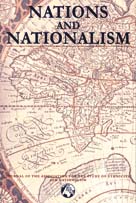Article contents
Contested nations: Iraq and the Assyrians
Published online by Cambridge University Press: 01 July 2000
Abstract
The formation of nation-states from the ruins of the Ottoman Empire in the Middle East after World War I, under colonial auspices, proceeded with negotiations in some instances and hostilities in others from previously autonomous communities, some of them formally designated as millets. Iraq comprised a diversity of religious and ethnic communities. The Assyrians, Christian mountain tribes, mostly refugees from Turkish Kurdistan under British protection, were one community which actively resisted integration into the new nation-state and, as a result, were subject to violent attacks by the nascent Iraqi army in 1933. This episode and the way it was perceived and interpreted by the different parties is an interesting illustration of the political psychology of communitarianism in interaction with nationalism, complicated by religious identifications, all in a colonial context. Subsequent histories and commentaries on the episode are also interesting in illuminating ideological readings.
- Type
- Research Article
- Information
- Copyright
- © 2000 Association for the Study of Ethnicity and Nationalism
- 8
- Cited by


